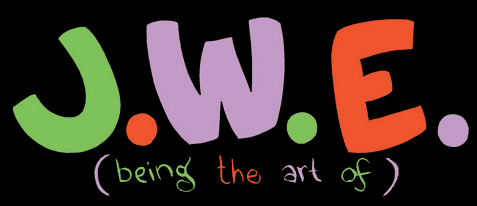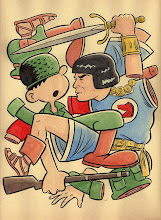 Myself, as pictured on my resident alien card from 1985. William Cowper, as pictured in an engraving from 1785.
Myself, as pictured on my resident alien card from 1985. William Cowper, as pictured in an engraving from 1785.What follows is a confession of sorts, a little admittance of delusional self-aggrandizement that began when I was a teenager and quickly took on a life of its own, a dizzying tale I attempted to forge into an extended comic story more than a dozen years ago, but was stopped in my tracks by the one very real aspect of its fevered narrative, namely depression.
I’m talking of the physical malady, not the temporary emotional state associated with sadness. Referring to chemical depression as sadness is akin to calling vertigo a fear of heights, the surface mannerisms of each being read as root cause, both highly erroneous assumptions.
This is a depression inherited, passed on through paternal DNA, black wings visited upon brother, father, grandfather – and likely back on into the well of generations past – all the way to the man with whom my teenage self found ample solace, the English poet William Cowper, my paternal grandmother having been Elizabeth Cowper.
William Cowper, born in 1731, was perhaps the most popular poet of his time, famous for writing spiritual works like the Olney Hymns, the romantic long poem The Task, humorous, satirical jabs like The Diverting History of John Gilpin, as well as The Negro's Complaint, which, set to music, became something of an anthem for the abolition movement.
A life-long sufferer of manic depression, Cowper existed on the periphery of life’s carnival, subject to extended bouts of what was then called melancholy, more than once attempting to take his own life, acts which saw him sequestered within various asylums. The torment of these days was perhaps best expressed by one of his last poems, The Castaway, published in 1799.
At length, his transient respite past,
His comrades, who before
Had heard his voice in ev'ry blast,
Could catch the sound no more.
For then, by toil subdued, he drank
The stifling wave, and then he sank.
My adolescent affinity with this deeply spiritual ancestor was at odds with the rebellious scorn I held for religion in all its forms, and yet I found myself gravitating to this tortured soul, not so much his writing (which I found tedious at best) but more the mystique of his permanence, the staying power of his transcribed thought, and later – when I began to encounter my own melancholy ways – the travails of his personal life, spelled out eloquently in his abundant and effusive letters.
It was about this time that I happened upon an engraving of the poet that haunted me, his facial features eerily echoing my own (see accompanying images). I began to question my mockery of such beliefs as reincarnation and the eternal soul, guiltily holding a growing appreciation for the notion of a consciousness running the generations, rising to the surface in every appropriate vessel, myself the latest such portal, one through which the essence of William Cowper was relieving its tragic fate.
Finally, after years of silently carrying this curious, scurrilous awareness, I decided to give it air, to see if it could sail the waters of my own chosen form of literature, the cartoon.
This was 1995. I was just thirty-one and only beginning to reckon with my own depression, one which would quickly intensify with the coming years, creating a decade of artistic wheel-spinning, every project started soon aborted, stashed to the shadows of my self-generated despair.
One such abortion was Squealer!, a planned epic cartoon story designed to tell the twisted tale of Cowper and his defining malady, its persistent journey through the generations, right up to the current day.
I had chosen to root much of his anguish in the classical repression of earthly activity, the sexual life that Cowper quite clearly had rejoined himself from. Needing a visual metaphor for this curse, I settled upon the mad fury of the insect, the feverish propagation we witness in every buzzing lek of gnat and fly. This was to be the voice of Cowper’s despair, one he would share with his ancestral chain, culminating in what I intended to be a graphic repudiation of all that Cowper held as holy, the binds of his suffocating devotion to God being sprung free in an orgy of sexual madness that would rupture the time continuum, ushering in an age of chaos, man becoming the frantic buzz in the ear of a cosmos awakened.
Or something like that, anyway.
As so happened, I managed not quite a dozen pages, before retreating into an acutely emerging self-doubt.
Thus, some nearly fifteen years later, my trajectory still flirting with its stubborn Cowperesque tendencies, I’m attempting to swat away the flies by unleashing these eleven ink-stained paperboards, their all-but-wordless narrative now subject to public discourse.
I hope you enjoy them, for what they’re worth – a hint of what might have been, and may still be – in some other life – perhaps one waiting on down the line.












